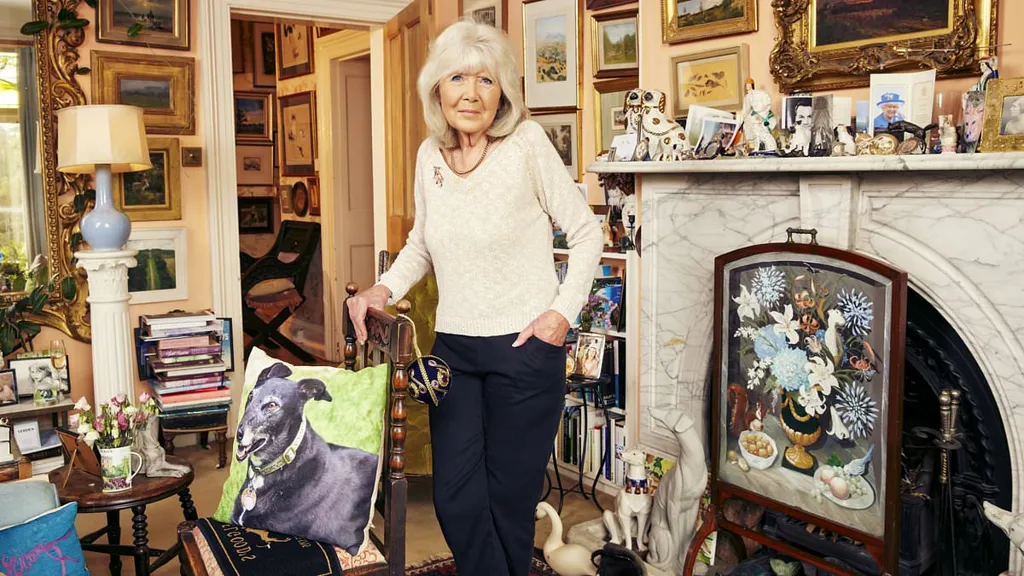First Patricia Routledge, now the great, incomparable Jilly Cooper. Two icons of British culture gone in the space of just a few short days.
I hope someone's keeping a close eye on Dame Joan Collins and Dame Joanna Lumley: we can't afford any more losses. They simply don't make them like that any more.
I was 16 when Riders was published in 1985. That cover - a woman's perfect bottom in tight white jodhpurs, a whip to her left, a man's hand resting firmly on her buttock - was received with gasps of delighted shock in the sixth form common room.
Well-thumbed, it was passed around like bootleg vodka: illicit, intoxicating, enough to make your eyes water (or turn you blind if the old wives' tales were to be believed).
Teachers dismissed it as trash, of course.
We hormonally charged teens, however, loved it (Cooper herself was known to staff at her school as the 'Unholy Terror'), inhaling the heady mixture of sex, scandal and stabling, reeling at the racy descriptions of posh people behaving, as my grandmother would have said, 'no better than they ought to'.
We had no clue what half of it meant, but it made us feel terribly grown-up to pretend.
It wasn't just her fluid writing, that rollicking, unpretentious, unashamedly saucy style of hers. She also had a journalist's eye for detail and a great nose for a story.
Dame Jilly Cooper, who has died aged 88, wrote her novels for legions of wives and mothers.
Even so, Dame Jilly wore her talent and success lightly, and was never - even when she might have had every right to be - a diva. She was invariably polite, patient and generous to a fault. She had a knack for making everyone around her feel loved and just radiated positivity and warmth.
She knew that some people didn't consider her a 'serious' literary figure - yet her sales told a different story, proving that so-called literary experts (in her day, almost invariable male) often don't have a clue what real people actually want to read.
Indeed, Auberon Waugh, that most elitist and patrician of contrarians, described her as 'glib, facile, immature and superficial'. While The Economist dismissed her as 'smutty, sexist and snobbish'.
Newsflash: she wasn't writing for them. She was writing for other women. Her audience was the legions of wives and mothers weighed down by responsibility, for whom the passing fantasy of the 'improper use of a hayloft' in the company of a Rupert Campbell-Black-type made it all more bearable.
Her books were harmless escapism, the perfect combination of sauciness, absurdity and social comedy. And, of course, equestrian double entendres.
If Cooper gave two figs for what the critics thought, she never showed it. She was cheerfully self-deprecating about her success and just enjoyed it for what it was.
Dubbed 'the Queen of the bonkbuster', Dame Jilly seemed like the ultimate sexually liberated feminist.
Except, of course, it wasn't really like that. Despite all the racy entanglements in her novels, in her private life Cooper was rather conventional, and by all accounts loyal to her husband Leo Cooper, once joking that her own life was 'far duller' than her books.
Indeed, it was Leo, and not Jilly, who strayed from the marriage, conducting a lengthy affair with the publisher Sarah Johnson in the late 1980s and early 1990s.
Despite telling the Mail in 1999 that 'It was the worst time of my life - I felt as though my heart had been broken into a thousand pieces', she stuck by him.
When he was diagnosed with Parkinson’s in 2002, she nursed him until his death, aged 79, in 2013, after more than 50 years of marriage. She never regretted her choice. 'You either forgive, or you destroy everything you've built together,' she once said. 'I chose to forgive - and thank God I did.'
But that was Dame Jilly all over. She was just so grateful for her life, her children and her success.
She wore it all so lightly, unlike so many of today's young authors and actors, who take themselves so seriously (see Emma Watson et al). And she never, ever did another woman down.
As one friend who saw her very recently at the BAFTAs said: 'She was strikingly generous with her time and advice. She had old-school manners and was a great letter-writer. Everyone has a generous Jilly story. She was the ultimate "pay-it-down" person - she encouraged everyone and did her very best to help them.'
She's right. My 'generous Jilly' story is the time she sent me an adorable little gold and amethyst brooch in the post. I'm wearing it now in memory of her. I can't for the life of me remember why she sent it to me - but then Dame Jilly never needed an excuse to make someone else feel loved.
She was truly one of the kindest women I've ever known. The world is a far less fabulous place without her.
